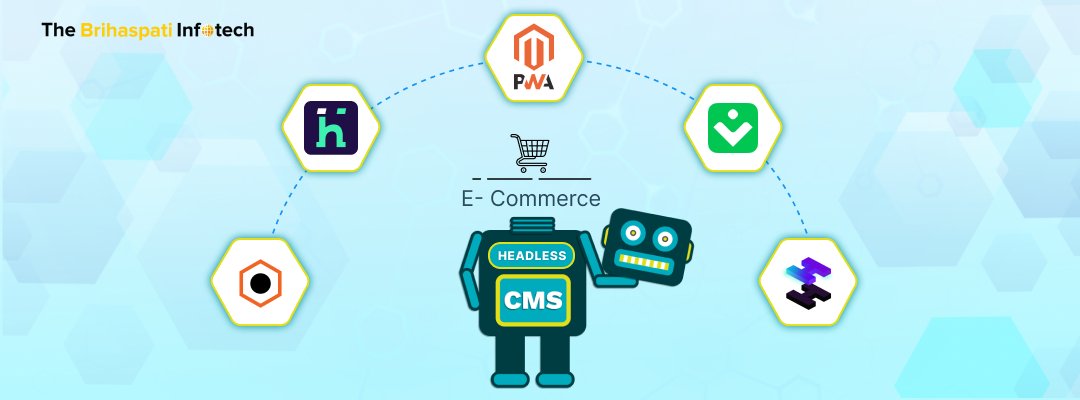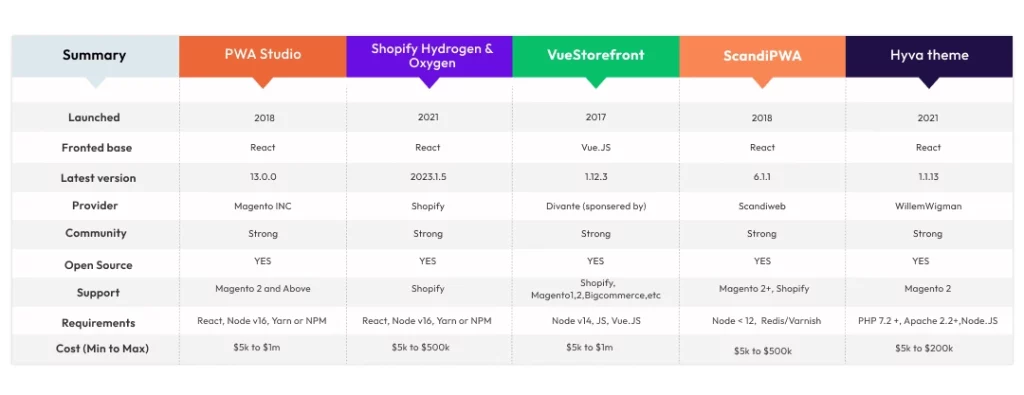Headless E-Commerce Solutions: The Good, The Best, & How to Choose

E-commerce has revolutionized the shopping experience with its advanced features and capabilities. However, to ensure a flawless shopping experience, addressing the issues that users encounter is essential. In 2013, Direk Hoireg coined the term “headless” to describe an approach that can make e-commerce faster, more reliable, and more engaging with headless e-commerce solutions.
“Headless commerce is a great way to speed up your ability to launch new commerce initiatives, get to market faster and test and learn at a much faster pace.” – Brian Walker, Chief Strategy Officer at Bloomreach
What is Headless E-commerce?
Headless e-commerce refers to detaching or separating the front end and back end from each other. It enables them to function independently, providing increased flexibility in terms of customization and integration with external platforms. It allows creating changes in the front end by using the required APIs without changing the back-end platform.
Likewise, We can replace the back end without affecting the user-facing aspects of the website. This approach enables businesses to provide a more seamless and engaging shopping experience. While also simplifying the process of integrating with other systems and services.

To assist you in selecting the suitable headless e-commerce solutions platform for your website, we will conduct a comprehensive analysis and comparison of the best headless e-commerce platforms today. Stay tuned for insights that will assist you in selecting the perfect solution to enhance your online business!
1. Progressive Web App (PWA) Studio

Magento PWA studio is facilitative to developing progressive web apps and storefronts solutions for integration with the back end by using APIs. Progressive web apps are beneficial for web stores to eliminate the requirement of developing separate native mobile apps for Android or IOS. PWAs can work as a native mobile app that covers almost all the features that native mobile apps contain.
Compatibility with Other Platforms
The developers initially designed Magento PWA Studio to work with Magento back-ends, especially versions 2.3 and above. However, the Studio contains several tools and libraries that developers can utilize to build front-end frameworks. Using the storefront developed by PWA Studio in conjunction with any CMS platforms such as WordPress, Joomla, Shopify, and BigCommerce.

Furthermore, using the PWA Studio with a CMS platform other than Magento would require customization and development to ensure smooth integration.
Cost-effectiveness and Turnaround time
PWA Studio is an open-source tool, which means it is free to use for anyone who wants to develop a PWA front-end solution. However, building a PWA front-end solution can be challenging and require technical knowledge and developer support. As a result, to ensure the success of your project, it’s important to hire Magento developers who have experience working with PWA Studio and can provide the necessary.

The cost of hiring developers may vary based on the complexity of the project requirements and many other factors required to develop the custom storefront for your CMS platform.
Additionally, the turnaround time can also vary based on the project requirements. The development process can take anywhere from 4 to 6 weeks for a simple project, while more complex projects may take months to complete. It is crucial to factor in the development time and cost when considering building a PWA front-end solution using PWA Studio.
Scalability
Built with optimized React and Redux technologies, PWA Studio can handle high traffic loads, making it capable of delivering superior performance even under heavy usage. The designers of this specialized platform have ensured that it integrates effortlessly with Magento and other CMS platforms, providing exceptional scalability and the ability to handle massive traffic volumes while delivering a seamless user experience.
Latest Version and updates
The Magento PWA studio project was developed using the React and Redux frameworks and introduced in 2018. Since then, the development team has provided numerous updates to make it more useful for users. The current and latest version of PWA studio is 13.0.0, released in January 2023.
Community Support and Resources
PWA Studio has a vibrant community of developers and users who offer support and resources to those looking to learn more about the platform or troubleshoot any issues and provide solutions for headless e-commerce development. Here are some resources you can access for community support and information on PWA Studio:
- PWA Studio’s official documentation offers detailed information on how to get started with PWA Studio.
- PWA Studio GitHub repository is the central location for the latest code, documentation, and community resources.
- Magento Community Forums offer a space for developers and users to connect and ask questions related to PWA Studio and Magento.
- Magento DevDocs offers comprehensive documentation and resources on PWA Studio.
How it is different from other headless e-commerce solutions?
PWA Studio is an open-source PWAs and storefront solution that comes with sets of tools and libraries. It is one of the best headless e-commerce platforms to develop a customized front-end to integrate with any headless supported CMS like Magento, Bigcommerce, WordPress, or Shopify.
Developers can use it to create eCommerce marketplaces or multivendor stores, which offer merchants and consumers greater flexibility.
2. Shopify Hydrogen and Oxygen

Shopify Hydrogen is one of the well-known Progressive Web Apps (PWA) and headless e-commerce solutions that allows for the creation of a high-quality storefront for online retailers. It is a fully customizable front-end development solution that can seamlessly integrate with Shopify’s back-end systems.
On the other hand, Shopify Oxygen is a hosting solution designed to power the Hydrogen storefront. It means Shopify Oxygen provides the hosting and infrastructure for the storefront developed using Hydrogen. With Shopify headless e-commerce solution, retailers can ensure that the Hydrogen storefront is always accessible, fast, and reliable.
Together Shopify Hydrogen and Oxygen offer a comprehensive solution for creating a fully customizable and powerful Shopify headless e-commerce store. By leveraging the benefits of PWAs and Headless e-commerce, retailers can provide a seamless shopping experience to their customers while also enjoying the flexibility and scalability offered by the Shopify platform.
Compatibility with Other Platforms

Shopify Hydrogen headless solution, a top PWA and storefront development solution, exclusively works with Shopify and utilizes modern web technologies. Moreover, it is ideal for creating a customized storefront, using it with any other CMS platform would necessitate significant customization and could adversely impact performance and user experience. However, it is possible to integrate it with other platforms despite being primarily designed for use with Shopify.
Cost-effectiveness and Turnaround time
Shopify has different plans to develop an e-commerce store with them which start from basic, advanced, and Shopify plus if you have any of these Shopify plans you can use the Shopify hydrogen and oxygen without paying any extra cost. Since it is very technical to develop the Storefront by using Shopify’s technology you have to hire a Shopify professional which can cost you as per your requirements.

The turnaround time for developing a store on Shopify depends on the project requirements. When using a prebuilt template, it can take only a few hours or days. However, if we develop a custom Storefront for integration with a decoupled back-end, it may take several weeks or even months for Shopify headless e-commerce store.
Scalability
Furthermore, Shopify has recently introduced the Shopify hydrogen headless solution, a new platform architecture designed to enhance the scalability and performance of their platform. Hydrogen is developed to be a modular and flexible architecture that can scale to handle large volumes of traffic and transactions.
Utilizing Graphql, Shopify Hydrogen uses web caching to load data effectively, even at low internet speeds.
Latest Version and updates
Shopify announces the react-based PWAs and storefront development tool Shopify Hydrogen in 2021 to make things easier for users. Thereafter, Shopify provides many updates to enhance its performance the current and latest version of Shopify Hydrogen is 2023.1.5. There have been not any updates in Shopify Oxygen since its released.
Community Support and Resources
Since Shopify Hydrogen launched in 2021, community support is still growing. However, Shopify provides all the guidance and help on their official website to help their users with development issues. We can find the GitHub repository for Shopify Hydrogen, where all the details are available.
There are some helpful resources to get to know about Shopify’s Hydrogen
- Shopify’s official website has many documents to set up Shopify Hydrogen and Oxygen.
- Shopify Hydrogen Github repository also provides many details of the latest version and recent codes.
- Shopify support service is also available to provide solutions for headless e-commerce development.
How it is different from other headless e-commerce solutions?
Shopify Hydrogen and Oxygen is a significant project launched by Shopify to provide Shopify headless e-commerce solution. This platform offers developers complete freedom to customize and develop headless e-commerce stores by using its features. It is primarily designed to work with Shopify’s back-end system, to use instead of other CMS platforms.
Shopify provides many features and development solutions to its users. If you are thinking of utilizing all these features, Shopify hydrogen, and oxygen will be the best option for you. Because this platform enables developers to seamlessly integrate a customized front-end system with a headless Shopify back-end system.
3. VueStorefront

VueStorefront is a potent, independent development tool that enables the building of PWAs and storefronts that are compatible with any CMS platform. Its development involved the use of Vue.JS, Node.js, and Graphql, making it easy to integrate with different CMSs. In addition, VueStorefront boasts a flexible and customizable architecture, which makes it an ideal choice for businesses with the best headless e-commerce platforms.
Compatibility with Other Platforms
Its tools and libraries enable easy integration with any CMS platform, making it straightforward to use VueStorefront a standalone solution. Businesses can use VueStorefront to develop customized front-end systems that work seamlessly with their existing CMS platforms.

Additionally, it is a very powerful option over PWA studio and Shopify headless e-commerce solution.
Cost-effectiveness and Turnaround time
VueStorefront is a free and open-source tool that enables businesses to develop PWAs or front-end systems without incurring licensing or subscription fees. However, developing front-end solutions for headless e-commerce using VueStorefront requires technical expertise and the assistance of a professional developer.

The cost of hiring a professional developer for developing a customized front end can vary based on specific project requirements. It is important to note that hiring a skilled developer can help ensure the development process is efficient and effective.
Similarly, the development timeline for a headless e-commerce store depends on the project requirements. Developing a custom headless store requires technical expertise and extensive development work. So the development timeline can range from several weeks to several months.
Scalability
Vuestorefront is a highly scalable solution to work with any CMS platform to handle more traffic & seamlessly pass API connections. It can easily manage all traffic and payment processing because of the Vue.js and Node.js technologies used in the development. This makes it one of the best headless e-commerce platforms to develop faster and more engaging storefront solutions for your CMS platform.
Latest Version and updates
Since its launch in 2017, Vuestorefront has undergone numerous updates and enhancements to enhance its performance and features. A vast and active community of developers currently maintains the platform and continues to work on improving it and adding new features.
Vue Storefront 1.12.3 is the most recent and up-to-date version of Vuestorefront, updated and released in 2021.
Community Support and Resources
Vuestorefront has a vast and supportive community that actively contributes to resolving any bugs or issues. To assist users and provide the necessary information, Vuestorefront offers development and customer support through its official website. Additionally, the Vuestorefront team frequently updates and maintains multiple GitHub repositories that contain useful setup files, simplifying the onboarding process for users.
How it is different from other headless e-commerce solutions?
VueStorefront is a versatile and standalone tool that can seamlessly integrate with any back-end CMS platform. With the support of a large community of developers, VueStorefront offers a cost-effective solution for building powerful and customizable storefronts.
VueStorefront is an excellent choice for businesses looking to develop a high-quality storefront on a tight budget. It is one of the most recommended headless e-commerce solutions to develop the custom front-end for your custom CMS platform
4. ScandiPWA

Developers can create PWAs and storefronts using ScandiPWA’s open-source theme for Magento. ScandiPWA is able to craft the front-end user interface and incorporate it with the back-end database. ScandiPWA employs contemporary technologies such as React, Redux, and GraphQL to construct the theme, for a better mobile-friendly user experience.
Compatibility with Other Platforms
ScandiPWA is initially designed to work with Magento as a front for e-commerce applications. It uses Magento’s APIs to access data from the backend, such as product information and customer details. While it is possible to use ScandiPWA with other CMS platforms, this would require significant development effort to customize and integrate its APIs with other backend systems.

However, Using ScandiPWA with other platforms could reduce its efficiency and lead to a suboptimal user experience.
Cost-effectiveness and Turnaround time
ScandiPWA is a free and open-source Magento theme. However, technical expertise is required to customize and integrate the theme with the backend. As a result, to ensure the success of your project, it’s important to hire developers who have experience working with PWA Studio and can provide the necessary support

Developers can create a PWA-based storefront in less time and at a lower cost by using ScandiPWA from scratch. However, if you want to use ScandiPWA with a different CMS platform, you would need to hire a developer.
Scalability
ScandiPWA ensures optimal user experience by designing and implementing a PWA-based solution that delivers high performance, It can easily access devices, such as mobiles, computers, laptops, and other gadgets, making it highly versatile. Furthermore, ScandiPWA can handle high traffic, enabling e-commerce stores to operate more quickly and engagingly for users.
Latest Version and updates
In 2018, Scandiweb released ScandiPWA, a PWA storefront development tool intended for Magento to create seamless e-commerce experiences. Developers constantly update the platform to add new functionalities and address any reported bugs or issues. It helps to ensure that the platform stays up-to-date and performs optimally, meeting the evolving needs of users.
Developers recently updated the latest version of ScandiPWA to 6.1.1 in January 2023. Moreover, they fixed numerous bugs and modified them from React to Preact.
Community Support and Resources
ScandiPWA is supported by a thriving community that provides assistance and error rectification, continually enhancing the theme’s features for users. Primarily developed for Magento, many Magento developers highly recommend this PWA-based theme. However, you can access various resources to receive helpful community support for ScandiPWA.
- ScandiPWA’s source code is available on GitHub for developers to collect available details.
- The documentation is available on its official website which covers all aspects of the platform.
- ScandiPWA’s community forums provide a platform for users and developers.
How it is different from other headless e-commerce solutions?
ScandiPWA is a very powerful and the first open-source theme of Magento, it doesn’t require extra effort to build a storefront. It is a pre-built theme that allows making customization and modification to integrate it with CMS platforms.
If you plan on using Magento as your back-end CMS platform, ScandiPWA is an excellent recommendation. However, if you intend to use a different or custom CMS platform, it may not be a savvy option.
5. Hyva theme

Hyva is a storefront solution theme specifically designed for building headless eCommerce stores. It is an open-source theme and primarily focuses on working efficiently with Magento 2, it helps to straighten the integration process with the back-end system.
Hyva offers a range of powerful storefront development features that provide a seamless user experience to customers, Hyva uses modern technologies such as React, Redux, and GraphQL to build fast and optimized storefronts. Additionally, it offers flexible customization options and a modular architecture that allows for easy modification and addition of features.
Compatibility with Other Platforms

The Hvya theme is designed to work with Magento 2 as a front-end solution for a decoupled back-end to develop a headless e-commerce store. While it is initially designed for Magento 2 it is compatible to work seamlessly with Magento’s back-end system.
However, intently it is designed to work as a storefront solution for developing headless e-commerce stores, so by using the APIs and making some customization we can integrate it with any other CMS platform such as Shopify, Bigcommerce, Drupal, and any other custom CMS platform.
Cost-effectiveness and Turnaround time
One of the advantages of using Hyva is that it is one of the cost-effective headless e-commerce solutions that does not require significant upfront investments. However, to take full advantage of the Hyva platform, it is recommended to hire a specialized Magento 2 developer who can help with the development and integration process.

Overall, Hyva is a pocket-friendly eCommerce solution that can help businesses save money and reduce development time compared to building a storefront from scratch.
Scalability
Hyva was built using modern technologies such as React, Redux, and GraphQL, which provide the necessary scalability and flexibility, to build a headless eCommerce storefront that can handle increased traffic and data. Hyva allows businesses to scale their storefront separately from their backend systems, which can help reduce the strain on the overall infrastructure.
It reduces the loading time of the pages and makes it almost instantly, which provides the best users experience to customers and help to scale the businesses.
Latest Version and updates
Hyva was launched in 2021 since then it has become one of the first choices of developers to develop a PWA-based storefront solution for headless e-commerce stores. The development community of Hyva has made many updates to fix the bugs and make it more reliable
The latest version of the Hyva theme is 1.1.13 which is previously released.
Community Support and Resources
Hyva benefits from a growing community of users and developers who contribute to its development and offer support to others. Here are some resources you can use to find community support and resources for Hyva:
- Hyva’s source code is hosted on GitHub.
- The Hyva documentations are available on the official website.
- The Hyva blog offers regular updates on the theme’s development.
How it is different from other headless e-commerce solutions?
Hyva is another open-source theme to develop a scalable storefront for Magento 2 and other CMS platforms, we can use this theme with other headless supported back-end CMS platforms. But it will work smoothly with Magento 2 and above because it was initially designed to work with Magento’s back-end system.
If you are choosing Magento 2 over any other CMS platforms you can keep this headless e-commerce solution on your favorite list.

Final Words
In conclusion, headless e-commerce is a powerful approach that allows online retailers to provide a seamless shopping experience.
All the above solutions can build a headless e-commerce store, but it depends on requirements and the functionality for projects that your business requires. Where PWA studio, ScandiPWA, and Hvya theme are helpful to develop a Magento e-commerce store, Shopify hydrogen headless solution and Oxygen are compatible with Shopify, and Vuestorefront can easily be integrated with any CMS platform.
Additionally, if you are looking for a reliable and experienced partner to provide headless e-commerce solutions for your business, TBI can assist you. Our team of skilled developers has vast experience in creating customized and scalable headless e-commerce platforms to help businesses. Contact us today to discuss your requirements and learn more about our services.

